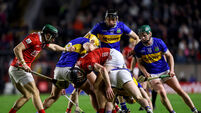History corner: The execution of Charlie Kerins by Tom Pierrepoint 70 years on

DURING the Second World War, the IRA sought to align this country with Nazi Germany against Britain. But members of An Garda Síochána were particularly effective in counteracting this treachery.
As Garda commissioner in 1933, Ned Broy had moved to avert the danger of a Blueshirt coup d’etat by recruiting some former republicans for the Special Branch. They were dubbed the “Broy Harriers”. With their old contacts within the IRA they were later able to round up republicans engaged in Nazi intrigue.
















